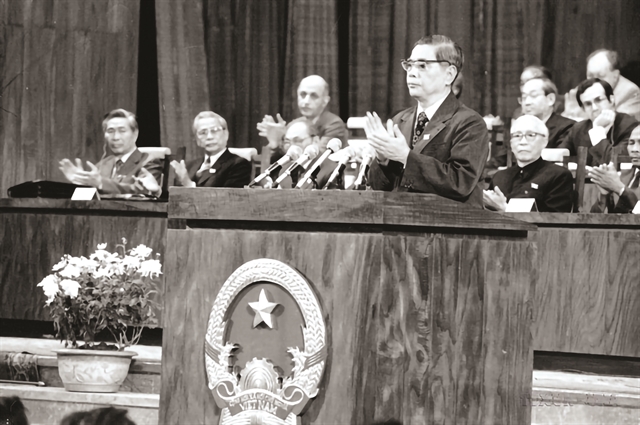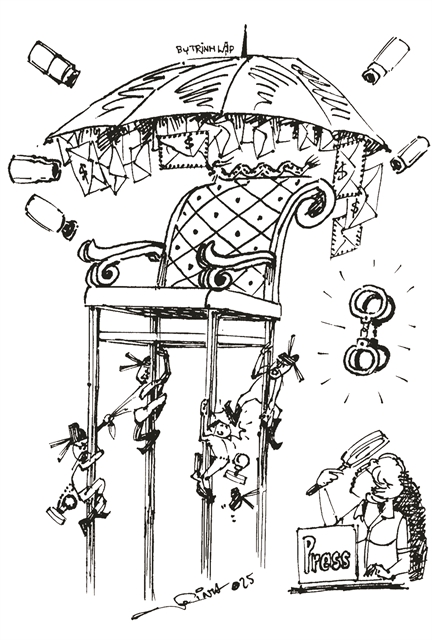 Talk Around Town
Talk Around Town

 |
| Illustration by Trịnh Lập |
By Nguyễn Mỹ Hà
In newsrooms and editorial boards around the country, discussions are being about the role of an objective press. Veteran journalists often talk about how they made an extra phone call, asked a tough question or made efforts to get closer to their subjects to reach the truth, even if doing so might put them on dangerous terrain.
Today, however, anyone with a working camera, at the right place at the right time, can send information to newsrooms to be verified and published. Citizen journalism offers an extended hand to mainstream journalists, who may not have been on the scene to witness news as it happened.
So, what exactly does being a journalist mean? Seeking the truth, or gathering enough evidence to support a point of view? Crafting a fact-based news story? Getting that quote from an outraged victim who has been negatively affected in some way? Reporting about the disadvantaged, the weak, the less privileged?
All the aforementioned practices combined make the daily work of a journalist. Most of the time, they help make a story sound well-based, reliable and appealing to readers. But sometimes, they may get the facts right, but the overall picture wrong. A fact-based story can sound very convincing, but the overall or long-term trend may be missed.
In this country, the Government's recent crackdown on the illegal production of fake goods, child formulas and surgical spirits has made it as important as ever for people to report on such wrongdoings. General Secretary Tô Lâm of the Việt Nam Communist Party on June 16 told a meeting of the Hà Nội Party Committee that he would not tolerate such violations.
"We should direct all relevant bodies as well as our entire society to fight against smuggling and fake goods to protect consumers' rights and for the sustainable development of our country," he declared.
Just weeks previously, an ex-worker of a prominent multinational meat processing company wrote an open letter to the country's highest leaders, requesting them to consider a more in-depth investigation into the system and practices of the company's operations in Việt Nam.
The man wrote that during his time working for the company, he was ordered to mix meat from sick pigs, with the meat already stamped to be discarded or destroyed according to veterinarian regulations.
He took photographs of the alleged violations and attached them to the letter.
The man pointed out that, before resigning from the company since, he reported the violations to local store supervisors, then regional and country managers. He even alerted the company headquarters, but all the attempts went unanswered.
Many see the fight as similar to the one between David and Goliath: a citizen with no job, and reportedly a critical health condition, trying to fight a multinational company over the latter's wrongdoing.
What should reporters do when the wrongdoings come to light? Of course, they should ask all the questions they can. But can they get access to the man's colleagues? Can they get a statement from the company itself? Can they somehow check the products for sale for any other wrongdoing? Perhaps most importantly, do the reporters have the editors backing them up because of pressures depending on the companies or institutions involved?
In a press conference at the Ministry of Agriculture and Rural Development after the open letter went viral on social media, ministry officials reiterated that the alleged violations should not be able to happen, and that the police would investigate thoroughly.
Readers on social media voiced not only their concerns about bad meat in the system, but many exclaimed their worries for the well-being of the man, as rumours began to swell online about his safety.
This type of story is now typical: featuring a mix of high-profile investigation, sitting alongside online comments and gossip from regular citizens. The case may eventually be brought to court, giving the story a hard and real edge, but news outlets also have to contend with deciphering the level of information found on social media, which is often far from concrete.
Being a reporter, or a citizen journalist, means being able to ask questions of people in power, those who can make decisions that involve the lives of millions of others, and hold them accountable for what they do. The power of the press, ultimately, lies in the hand of those who have the audacity to ask questions. VNS